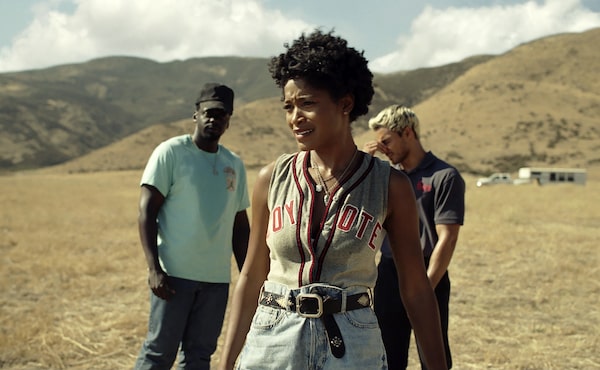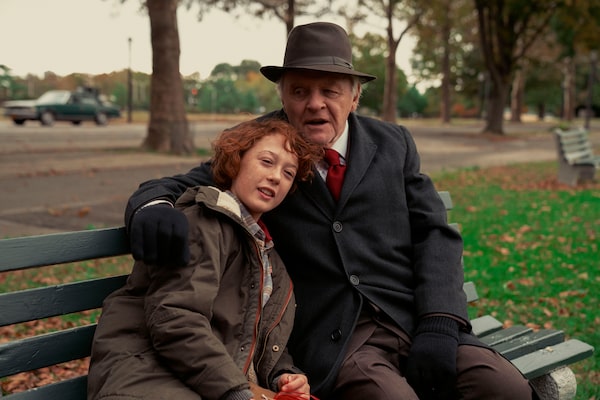This Sunday’s 95th Academy Awards will offer one more glitzy push for 10 films that have dominated the movie discourse – even parts of the box office! – for the past year. And while Tar, Everything Everywhere All at Once, Elvis, Top Gun: Maverick and the other Best Picture nominees are worthy of the spotlight (okay, maybe everything except Triangle of Sadness), there are a Dolby Theatre’s worth of eligible movies that didn’t get any love from the Academy at all.
Which is why The Globe and Mail presents its annual Alterna-Oscars: a quick guide to the should’ve-been-contenders – and how you can watch them from the comfort of your own home this weekend.
Decision to Leave (streaming on MUBI, on-demand on Apple TV)

Park Hae-il and Tang Wei in Decision to Leave.Courtesy of Mongrel Media
Genre-hounds dazzled by Park Chan-wook’s landmark “vengeance” trilogy (Sympathy for Mr. Vengeance, Oldboy, Lady Vengeance) might be surprised when diving into the South Korean filmmaker’s latest movie, Decision to Leave. More slow-burn Hitchcockian homage than gross-out spectacle – the hammer attacks and live-squid slurping of Oldboy is nowhere to be found – Park’s new film delivers shock value in so much only as how it might shock fans who have not yet strayed outside that much-loved outré trilogy. But for audiences who have taken the time to become familiar with Park’s postvengeance filmography, especially the patient eroticism of Stoker and The Handmaiden, Decision to Leave fits perfectly within the director’s meticulously assembled canon. His twin obsessions are lust and caution – and with apologies to filmmaker Ang Lee, Park has mastered both of those fixations with this detective story. Perhaps Oscar voters were simply expecting something different, by which I mean something familiar.
Till (on-demand, including Apple TV and Google Play)

Jalyn Hall, left, as Emmett Till and Danielle Deadwyler as Mamie Till-Mobley in Till.Lynsey Weatherspoon / Orion Pictures/Orion Pictures via AP
Two stars are born in Till, a wrenching drama that explores the aftermath of 14-year-old Emmett Till’s horrific assault and lynching in 1955 Mississippi – punishment, the story went at the time, for the young Black boy daring to whistle at a white woman. The first star here is filmmaker Chinonye Chukwu herself, who quickly and confidently establishes a visual language in her third feature (after the 2019 prison drama Clemency and 2012′s family drama alaskaLand) that is startling and beguiling – all prolonged close-ups, mirror images, and a keen sense that what is not captured onscreen is just as important as what is. It helps, certainly, that Chukwu has found the perfect star to be the focus of nearly every one of her film’s carefully staged, emotionally gruelling scenes: Danielle Deadwyler, who plays Emmett’s mother Mamie with such a profound and raw intensity that the actress (best known until now for her work on television’s Station Eleven) instantly cements her status as one of the most exciting performers working today. Yet strangely, neither director nor star got the Academy’s attention.
The Woman King (Crave)

Viola Davis in The Woman King.Ilze Kitshoff/Sony Pictures via AP
After Gina Prince-Bythewood’s historical action epic’s boisterous Toronto International Film Festival premiere this past September, it seemed that The Woman King was destined for Oscars glory. Or at the very least, that star Viola Davis would earn a Best Actress nod for her fierce, fiery performance as Nanisca, the strong-willed General of the Agojie, an all-woman army tasked with protecting the West African Kingdom of Dahomey circa 1820. Yet despite a good amount of awards-season attention, The Woman King was deposed by other, less enticing Oscar bait.
Nope (on-demand, including Apple TV and Google Play)

From left, Daniel Kaluuya, Keke Palmer and Brandon Perea in a scene from Nope.Universal Pictures via AP
I’m not entirely convinced that Jordan Peele’s sci-fi/horror/film industry satire works as a whole better than it does when sliced and diced into pieces. But on their own, those pieces should have at least counted for something when it comes to the Academy. Like, say, Keke Palmer’s performance as a too-enthusiastic alien hunter. Or the film’s meticulous, envelope-pushing cinematography, which reimagines a UFO film as a One Perfect Shot-style collection of iconic images.
Armageddon Time (on-demand, including Apple TV and Google Play)

Banks Repeta, left, and Anthony Hopkins in a scene from Armageddon Time.Anne Joyce/Focus Features via AP
James Gray’s most personal work yet – which is saying something, given how much of the New Yorker’s filmography is mined from his family history – has distressingly disappeared from the conversation barely a month after release. And when the drama lightly fictionalizing the director’s youth is discussed, it seems to be misunderstood as an apology, rather than a confession. Every one of Armageddon Time’s details and narrative swerves is stacked on top of the other to build a monumental story of compromises and consequences. This is a brave film, bracing and thoughtful, with a supporting performance from Anthony Hopkins that seemed like a match made in Oscars heaven.
 Barry Hertz
Barry Hertz